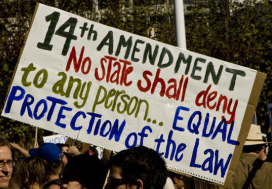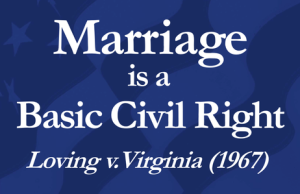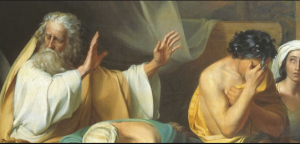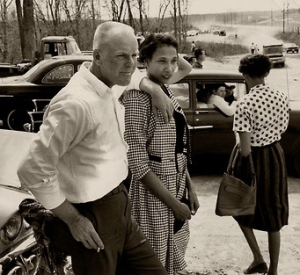Marriage is an American Civil Right
Over the past decade, the conservative political and religious right have warned people of faith that extending marriage equality to same-sex couples would “redefine marriage,” undermine the structure of the family, and threaten religious liberties.
Let’s look at the history of the definition of marriage in the United States
Since the 1780s, marriage in the United States has been a civil contract granting legal status to a couple during a public civil marriage ceremony performed by agents of the state. Marriages performed by priests or pastors are accomplished by clergy acting as agents of the state.
Before modern advocacy for same-sex marriage, the last major challenge to marriage laws in the United States came in the 1960s. Laws against interracial marriage, or miscegenation laws, had been in effect for nearly three centuries. According to many religious conservatives, it was a sin, as well as a crime, for a white person to wed a person of African ancestry.
A Bible account sometimes referred to as the “curse of Ham” (Genesis 9:18-27) was understood to mean that all Africans, who were thought to be Ham’s direct descendants, were cursed to be forever subservient to others and kept separate from other races. Hence, no intermarriage allowed. Though today this theology has been forgotten, or denied,[1] as recently as the late 1960s, various states still restricted marriage between a white person and a member of another racial group, primarily blacks.
Additionally, a dozen states forbade a white person to marry a Native American; one state banned such legal unions until as recently as 1959. In a dozen states, white people were banned from marrying Asians. Nine states banned whites and Filipinos from intermarriage. Curiously, some states banned white people from marrying Native Hawaiians.
In 1958, Mildred Jeter, a 19-year-old woman of African American and Native American descent traveled with Richard Loving, a 25-year-old white man, to Washington, D.C., to get married. Their home state of Virginia did not allow interracial marriage, but they were in love and wanted to get married. The Lovings had the full blessing of their marriage from their close-knit families. Though several other interracial couples lived in their isolated community, someone tipped off the county authorities about the Lovings’ marriage, illegal in Virginia. The local police raided the Loving home in the middle of the night, hoping to find the couple having “illegal” sex. There was no “crime” going on; they were sleeping. Mildred showed the police their marriage certificate, yet the couple was immediately arrested for “cohabiting as man and wife, against the peace and dignity of the Commonwealth.”[2]
The trial judge in their case, Leon Bazile, found the couple guilty and stated in his decision:
Almighty God created the races, white, black, yellow, and red, and he placed them on separate continents. And but for the interference with his arrangement there would be no cause for such marriages. The fact that he separated the races shows that he did not intend for the races to mix.[3]
In lieu of serving a one-year prison sentence, the Lovings were ordered to leave Virginia, and moved to Washington, D.C. After five years of living apart from their families, unable even to visit Virginia as a couple, Mildred wrote a letter to Attorney General Robert F. Kennedy, asking for his help. Kennedy’s office referred the Lovings to the American Civil Liberties Union (ACLU) in 1964.
Marriage declared an American civil right
 After a series of appeals in the lower courts, Loving v. Virginia made it to the United States Supreme Court in 1967. The justices ruled that Virginia’s and twelve other states’ statutes against interracial marriage violated both the Due Process Clause and the Equal Protection Clause of the Fourteenth Amendment. Chief Justice Earl Warren wrote the opinion for the unanimous court decision, outlining the importance of marriage: “Marriage is one of the ‘basic civil rights of man,’ fundamental to our very existence and survival,” he stated.
After a series of appeals in the lower courts, Loving v. Virginia made it to the United States Supreme Court in 1967. The justices ruled that Virginia’s and twelve other states’ statutes against interracial marriage violated both the Due Process Clause and the Equal Protection Clause of the Fourteenth Amendment. Chief Justice Earl Warren wrote the opinion for the unanimous court decision, outlining the importance of marriage: “Marriage is one of the ‘basic civil rights of man,’ fundamental to our very existence and survival,” he stated.
[box]Eleven years later, in 1978, the Supreme Court reaffirmed marriage as a basic American right under the Equal Protection Clause: “The right to marry is of fundamental importance for all” (Zablocki v. Redhail).[/box]
At the time of the landmark Loving v. Virginia case, the following were the four main arguments against interracial marriage:
- All interracial relationships, even committed, long-standing ones, were considered illicit sex rather than loving marriages and, thus, morally wrong.
- Interracial marriage was contrary to the will of God.
- Interracial marriage was “unnatural.”
- The right to legislate marriage should belong to the states, not the federal government.[4]
The major objections voiced by marriage equality opponents today are uncannily similar to yesteryear’s cries against interracial marriage:
- A moral wrong should not be a civil right or a “special right.”
- Marriage was created and defined by God as between one man and one woman, and cannot be redefined.
- Marriage between two people of the same sex violates natural law.[5]
- Popular vote should not be trumped by federal legislation.
Additional arguments are also heard about same-sex marriage:
- Let them have civil unions; it’s good enough.
- Religious leaders will be forced to perform same-sex marriages in their churches.
- Same-sex couples cannot procreate.
- Same-sex marriage will destroy the “sanctity of marriage.”
[box]That marriage is a civil right of fundamental importance for all American citizens has already been addressed—nearly half a century ago.[/box]
The LGBT community is legally a class of people and, by law, is due the protection and extension of civil rights accorded every class of people.
If you are interested in living in a country which is a theocracy, then you will need to move to: Iran, Saudi Arabia, Sudan, Yemen, Afghanistan, United Arab Emirates, Pakistian, and Mauritania or Vatican City.
A challenge to Christians: is it within your tenets to withhold justice?
Civil rights cannot be withheld simply because a group, whether the minority or majority, does not want to extend rights to another group. Popular vote has never dictated civil rights in America. So, on the most basic question of same-sex marriage, does withholding the right to civil marriage align with your personal Christian principles not only as a citizen of the United States but also as a citizen of the Kingdom of God?
Additionally, for Christians, the issue of same-sex marriage is not just about civil rights; it is more complex because to deny civil rights to a group of people is at odds with a doctrine of justice. There is no biblical precedent that validates the intentional discrimination of a group of people. To the contrary, we are prompted by our faith to do away with injustice and inequality.
[hr]
Other posts in this Series:
The Shifting Definition of Marriage
The Long Road to Marriage Equality in America Began in 1968
A Christian Case for Support of Biblical Same-Sex Marriage
Does Christian Marriage Require Complementarity?
Is Procreation an Imperative for Christian Marriage?
[hr]
(1) David Mark Whitford, The Curse of Ham in the Early Modern Era: The Bible and Justifications (Burlington, Vermont: Ashgate Publishing , 2009), 2.
(2) Claire Guthrie Gastañaga, “Loving Day – Celebrating the Freedom to Marry,” American Civil Liberties Union of Virginia, June 12, 2013, https://acluva.org/13299/ loving-day-celebrating-the-freedom-to-marry/.
(3) Ibid.
(4) Peggy Pascoe, “Why the Ugly Rhetoric Against Gay Marriage Is Familiar to This Historian of Miscegenation,” History News Network, April 19, 2004, http://hnn.us/ article/4708.
(5) “10 Reasons Why Homosexual ‘Marriage’ Is Harmful and Must Be Opposed,” TFP Student Action, http://www.tfpstudentaction.org/politically-incorrect/homosexuali- ty/10-reasons-why-homosexual-marriage-is-harmful-and-must-be-opposed.html..
[hr]




